Building a Shared Space of Innovative Research and Learning
CompetencyWorks Blog
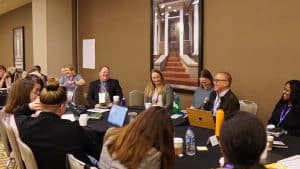 As fellow travelers in the education innovation and research space for more than a decade, we celebrate the advances in what we know about equitable, learner-centered transformation. At the same time, what we have learned across the field remains fragmented, locked away in small pockets of knowledge, and rarely elevated for collective learning and impact. Across all of these pockets, a foundational challenge we all face is rethinking how we conduct research and assessment within an education space undergoing deep transformation. For this reason, in November, our organizations — Aurora Institute, KnowledgeWorks, and The Learning Accelerator (TLA) — convened over 40 researchers for a second annual research roundtable at the Aurora Institute Symposium.
As fellow travelers in the education innovation and research space for more than a decade, we celebrate the advances in what we know about equitable, learner-centered transformation. At the same time, what we have learned across the field remains fragmented, locked away in small pockets of knowledge, and rarely elevated for collective learning and impact. Across all of these pockets, a foundational challenge we all face is rethinking how we conduct research and assessment within an education space undergoing deep transformation. For this reason, in November, our organizations — Aurora Institute, KnowledgeWorks, and The Learning Accelerator (TLA) — convened over 40 researchers for a second annual research roundtable at the Aurora Institute Symposium.
This group represented higher-ed, K-12 systems, non-profit, and for-profit organizations. It included professors, researchers, consultants, and educators from across the sector. Competency-based education served as an anchoring mechanism for the day’s conversations. Additionally, we recognize the need to bring the research community together to address a broader future of learning that is learner-centered, tech-enabled, and focused on the whole-child.
Framing for the Conversation
We crafted three sets of provocations to drive the conversation: 1) identify the most pressing areas that student-centered, competency-based education research must address; 2) clarify how a research collaborative could advance innovative methods and equitable measures; and 3) determine necessary policy levers and sustainable funding to support the future of learning. Within this framing, the roundtable then addressed the driving questions associated with each topic:
- Research Priorities — In what ways can research on student-centered, competency-based learning expand to better address under-researched areas of K-12 learning communities, ensure the inclusion of diverse and historically marginalized populations, and holistically support both academic outcomes and social-emotional/habits of success development?
- Innovative Methods and Measures — What innovative and equitable research and analytic methods can be developed to capture student progress and experiences in student-centered, competency-based learning communities, and how can current measures of student success be improved to better reflect the needs of traditionally underserved students?
- Knowledge Mobilization — How can we effectively mobilize research evidence on student-centered, competency-based learning to influence policy decisions and secure funding for future research? For policymakers, what types of evidence are most effective in influencing them to support the expansion of student-centered, competency-based learning, and how can research be designed to highlight both the benefits and challenges of scaling new learning models while addressing local contexts and needs? For funders, what are the main barriers to securing funding for research on student-centered, competency-based education, and how can researchers demonstrate its value and impact to attract investment from private foundations, federal grants, and other sources?
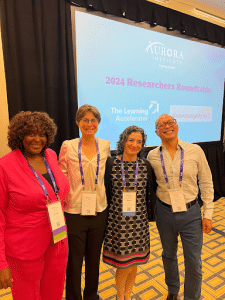
Identifying Shared Challenges
The day began with a brief presentation by Amber Garrison-Duncan, who shared an overview of a research agenda for competency-based education (CBE) constructed by a working group representing multiple perspectives from higher education, K-12, and the military. Using this work as our foundation, the group had two rounds of lively conversation, digging into the framing questions. During our time together, we began to coalesce around three challenges, with the hopes of moving forward as a research field to build an evidence base that can support learner-centered innovation.
- Conceptualization: Educators, researchers, leaders, funders, and policymakers hold different mental models of what learning looks like. This ranges from how learning is defined (i.e., based on seat time, demonstrations of skills, performance on assessments), to the conditions required to ensure that it occurs, to the definitions of terms that may vary across contexts. For example, what does “absenteeism” mean when learning in a mastery-based context, not bound by time?
- Research Infrastructure: We recognized that even our guiding questions harken back to classical methodologies that bias towards comparison groups, larger sample sizes, standardized practices, and quantitative methods — the types of studies most often promoted and valued by policymakers and funders. However, in personalized, competency-based learning, we celebrate flexibility and tailoring approaches, and have “myriad samples of one.” This presents a challenge to implementation and efficacy studies, particularly of innovative models.
- Research Foundations: Similarly, we identified challenges with the foundations on which most research is based — the research questions we are asking and the metrics and measures used. Traditional research relies heavily on benchmark and summative measures, particularly in English language arts (ELA) and math. When thinking about CBE, personalized, and project-based learning, these measures are often disconnected from the programs they intend to assess. If the goal is to better understand the efficacy and impact of more innovative models, then we need a more expansive foundation.
Next Steps
We recognize an urgent need to address these questions and challenges, both in our work and for the field. If the goal is truly to move towards an education future that is personalized, tech-enabled, and focused on the whole-child, then it is our responsibility to design studies that leverage metrics and measures capable of capturing the individual student and their profile of success. As a next step, we invite you to come join the conversation on January 30th for our next research roundtable. Together, we will build momentum for collective action and impact.
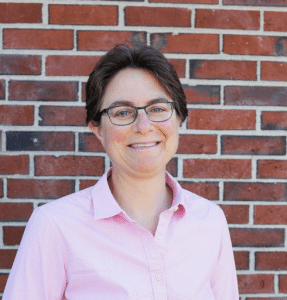
Beth Holland is a Managing Director at The Learning Accelerator and leads the organization’s work in research, measurement, and policy. She brings both a rigorous academic background and practical experience with schools, districts, and policymakers to the team’s efforts.
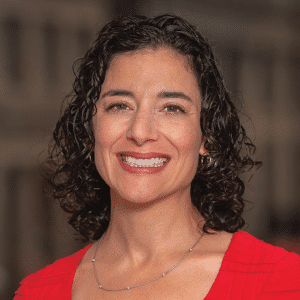
Rebecca Wolfe oversees the research, impact and improvement efforts that reinforce KnowledgeWorks’ program and policy initiatives and advance the field of personalized, competency-based learning. Prior to joining KnowledgeWorks, Rebecca served as an associate vice president at Jobs for the Future (JFF), where she founded and led the Students at the Center Initiative and its Student Centered Learning Research Collaborative.

Rolando Fernando is passionate about improving education with a focus on equity, specifically on how data and analytics can be used to foreground insights and stories that can help transform learning for historically marginalized populations. He helps develop the frameworks and infrastructures of impact assessment and continuous quality improvement for scaling personalized, competency-based learning through state-lift efforts
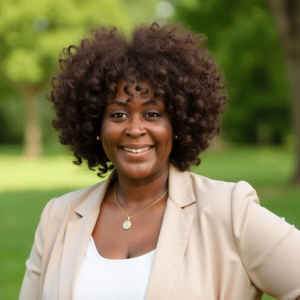
Dr. Jilliam N. Joe joined the Aurora Institute in 2024 as Aurora’s Research Director. She is an experienced psychometrician and program evaluator with a demonstrated history of working in nonprofit and startup environments. Dr. Joe is the founder and president of the consultancy